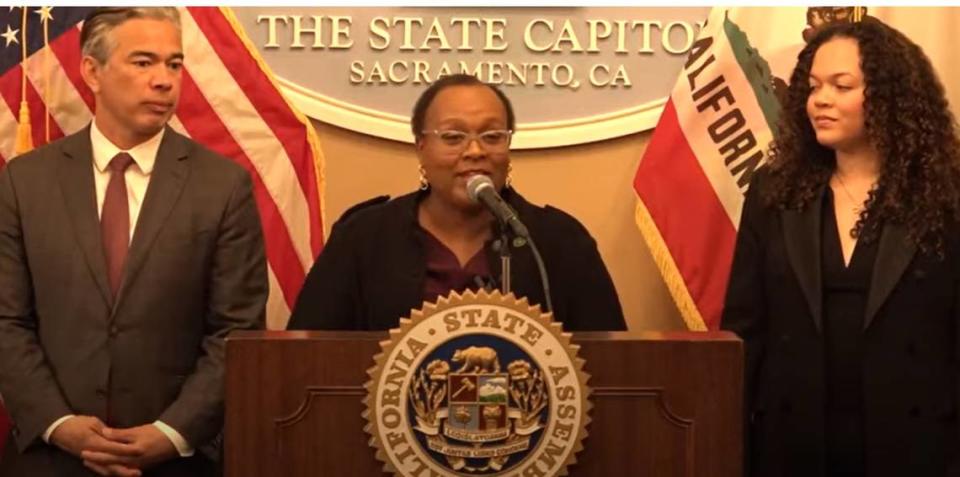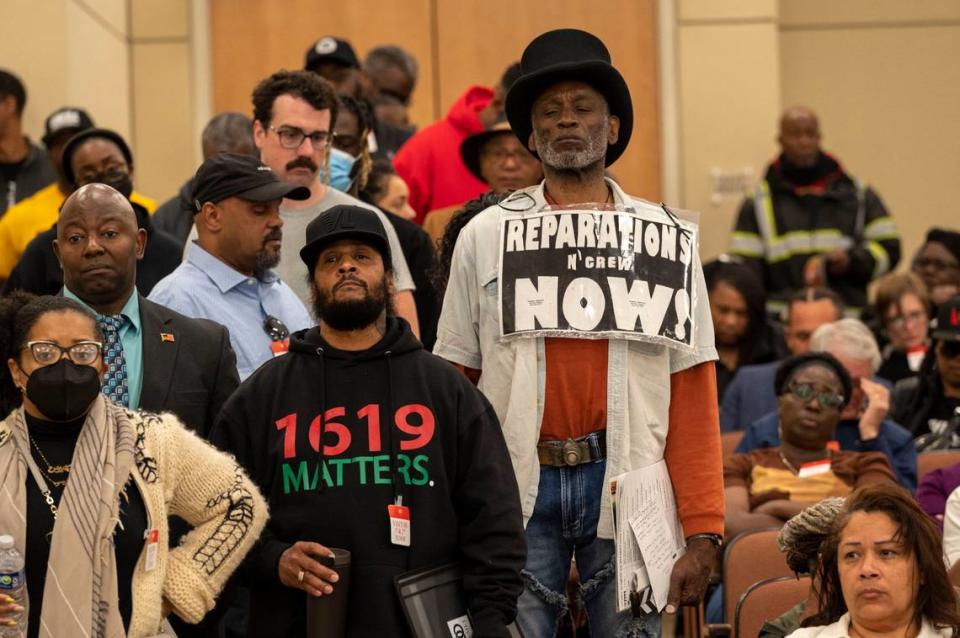California only budgeting $12 million for reparations shows lawmakers’ lack of urgency | Opinion
- Oops!Something went wrong.Please try again later.
A budget deal between Gov. Gavin Newsom and state Democrats that set aside a measly $12 million for “reparations, a system of redress for the descendants of former slaves in California,” was touted by some prominent members of the Legislative Black Caucus.
“That is a win,” said Assemblymember Lori Wilson, D-Suisun City, chair of the Black Caucus on Saturday.
It doesn’t feel like a win. Nor should it be considered one.
Opinion
Thousands of Black Californians are out of time, out of resources and desperately trying to make ends meet. The California Reparations Task Force was created in 2020 to study and develop policies — including cash reparations — for Black Californians, particularly those whose ancestors were stripped of legacy wealth by slavery.
Newsom set this process in motion, and California was touted as the first state in the nation to attempt to make reparations a reality. A voluminous report by the reparations task force made a case not understood by enough Californians: “The enslavement of African Americans had already started in California before the state had adopted an anti-slavery constitution in 1849.”
From the 19th Century lynching of a slave in the town square of San Jose to generations of economic and political disenfranchisement, a serious case for reparations for Black Californians was established by a committee of experts.
But what is being presented as “a win” did not match the urgency of the reparations issue or the current state of Black Californians who are overrepresented in poverty, incarceration levels within the state prison system and school drop-out rates — a consequence of generations of economic and political disenfranchisement.
Lackluster reparations bills
According to a report from UC San Francisco’s Benioff Homelessness and Housing Initiative on the experience of Black unhoused people in the state, more than a quarter of the state’s unhoused demographic is Black — nearly four times the state’s Black population. Despite California’s Black population making up just 7% of the state’s total population, today, 26% of the state’s unhoused population is Black, according to the U.S. Census Bureau.
If these numbers don’t prompt a sense of urgency among state leaders, then we’re in for a long road ahead. the initial set of bills to address reparations. The initial set of bills sounds like they could barely make a dent in providing reparations for those who were wrongfully incarcerated during the war on drugs period. “Pending bills include establishing the California American Freedmen Affairs Agency and having that new department investigate cases of possible racially-motivated eminent domain. They would also prevent the state from punishing prison inmates who refuse to work and help create a grant program to fund community efforts to decrease violence in neighborhoods and schools,” The Bee reported on June 23.
Without money getting directly into the hands of the impacted population, how can we possibly expect anything to change?
Black Californians deserve more
Reparation is a transformative justice. It’s not just throwing money at an issue, this is about transforming the lives of Black people that have been left behind by the state.
The $12 million budgeted for this project has a good chance of creating a foundation that can lead to repair.
Yes, in the face of an almost $47 billion shortfall, the amount does seem like it could be a good first step for the task force. And Wilson agrees: “Even in a challenging deficit year, we’ve had our leadership and the governor recognize the obligation to those impacted by slavery,” she said.
Newsom and the legislature deserve credit for seeking to repair injustices that were not addressed by their political predecessors. They have until Aug. 31, when the legislative session ends, to pass 15 bills and two constitutional amendments supported by the Reparations Task Force. It’s now put up or shut up time. The Legislature needs to get accustomed to passing reforms with reparations in mind, even if the initial steps are modest.
There has been a lot of talk about reparations becoming a reality in California. But if the plan continues to get drops in the bucket, it’ll surely amount to very little change for Black Californians.


